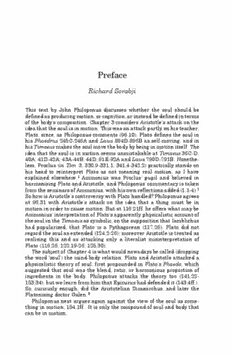Download Philoponus: On Aristotle on the Soul 1.3-5 PDF Free - Full Version
Download Philoponus: On Aristotle on the Soul 1.3-5 by Philip J. van der Eijk in PDF format completely FREE. No registration required, no payment needed. Get instant access to this valuable resource on PDFdrive.to!
About Philoponus: On Aristotle on the Soul 1.3-5
Until the launch of this series over fifteen years ago, the 15,000 volumes of the ancient Greek commentators on Aristotle, written mainly between 200 and 600 ad, constituted the largest corpus of extant Greek philosophical writings not translated into English or other European languages. Over 40 volumes have now appeared in the series, which is planned in some 80 volumes altogether. This text by Philoponus rejects accounts of soul, or as we would say of mind, which define it as moving, as cognitive, or in physical terms. Chapter 3 considers Aristotle’s attack on the idea that the soul is in motion. This was an attack partly on his teacher, Plato, since Plato defines the soul as self-moving. Philoponus agrees with Aristotle’s attack on the idea that a thing must be in motion in order to cause motion. But he offers what may be Ammonius’ interpretation of Plato’s apparently physicalistic account of the soul in the Timaeus as symbolic. What we would call the mind-body relation is the subject of Chapter 4. Plato and Aristotle attacked a physicalistic theory of soul, which suggested it was the blend, ratio, or harmonious proportion of ingredients in the body. Philoponus attacked the theory too, but we learn from him that Epicurus had defended it. In Chapter 5, Philoponus endorses Aristotle’s rejection of the idea that the soul is particles and of Empedocles’ idea that the soul must be made of all four elements in order to know what is made of the same elements. He also rejects, with Aristotle, definitions of the soul as moving or cognitive as ignoring lower forms of life. He finally discusses Aristotle’s rejection of Plato’s localisation of parts of the soul in parts of the body, but asks if new knowledge of the brain and the nerves do not require some kind of localisation.
Detailed Information
| Author: | Philip J. van der Eijk |
|---|---|
| Publication Year: | 2006 |
| ISBN: | 9780715633076 |
| Pages: | 224 |
| Language: | English |
| File Size: | 1.38 |
| Format: | |
| Price: | FREE |
Safe & Secure Download - No registration required
Why Choose PDFdrive for Your Free Philoponus: On Aristotle on the Soul 1.3-5 Download?
- 100% Free: No hidden fees or subscriptions required for one book every day.
- No Registration: Immediate access is available without creating accounts for one book every day.
- Safe and Secure: Clean downloads without malware or viruses
- Multiple Formats: PDF, MOBI, Mpub,... optimized for all devices
- Educational Resource: Supporting knowledge sharing and learning
Frequently Asked Questions
Is it really free to download Philoponus: On Aristotle on the Soul 1.3-5 PDF?
Yes, on https://PDFdrive.to you can download Philoponus: On Aristotle on the Soul 1.3-5 by Philip J. van der Eijk completely free. We don't require any payment, subscription, or registration to access this PDF file. For 3 books every day.
How can I read Philoponus: On Aristotle on the Soul 1.3-5 on my mobile device?
After downloading Philoponus: On Aristotle on the Soul 1.3-5 PDF, you can open it with any PDF reader app on your phone or tablet. We recommend using Adobe Acrobat Reader, Apple Books, or Google Play Books for the best reading experience.
Is this the full version of Philoponus: On Aristotle on the Soul 1.3-5?
Yes, this is the complete PDF version of Philoponus: On Aristotle on the Soul 1.3-5 by Philip J. van der Eijk. You will be able to read the entire content as in the printed version without missing any pages.
Is it legal to download Philoponus: On Aristotle on the Soul 1.3-5 PDF for free?
https://PDFdrive.to provides links to free educational resources available online. We do not store any files on our servers. Please be aware of copyright laws in your country before downloading.
The materials shared are intended for research, educational, and personal use in accordance with fair use principles.

